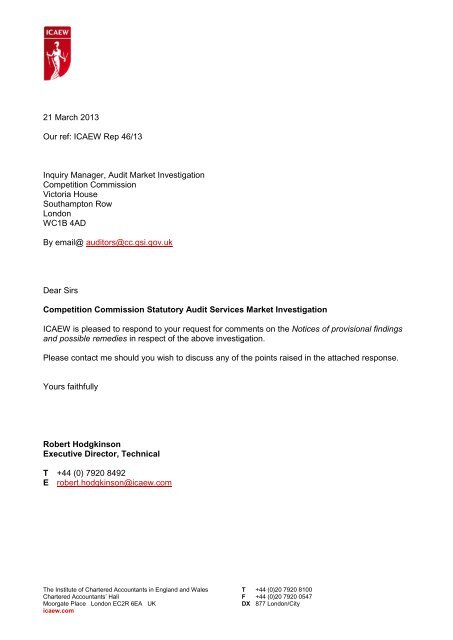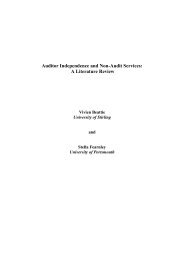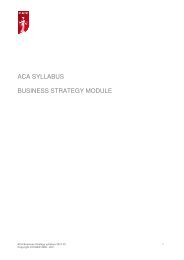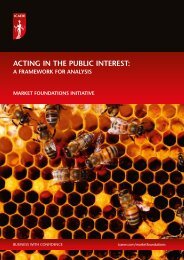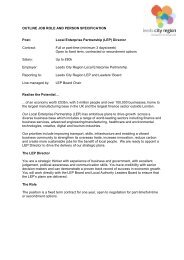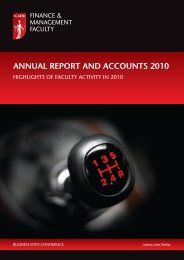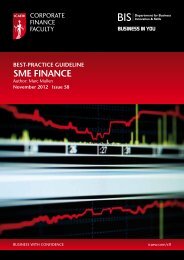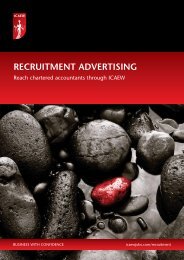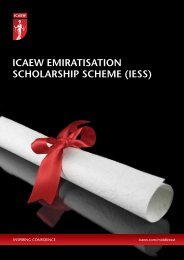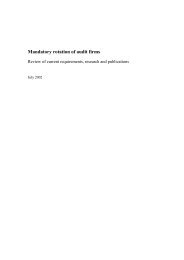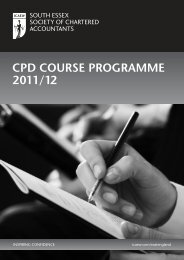ICAEW REP 46/13 Competition Commission Statutory Audit ...
ICAEW REP 46/13 Competition Commission Statutory Audit ...
ICAEW REP 46/13 Competition Commission Statutory Audit ...
You also want an ePaper? Increase the reach of your titles
YUMPU automatically turns print PDFs into web optimized ePapers that Google loves.
21 March 20<strong>13</strong>Our ref: <strong>ICAEW</strong> Rep <strong>46</strong>/<strong>13</strong>Inquiry Manager, <strong>Audit</strong> Market Investigation<strong>Competition</strong> <strong>Commission</strong>Victoria HouseSouthampton RowLondonWC1B 4ADBy email@ auditors@cc.gsi.gov.ukDear Sirs<strong>Competition</strong> <strong>Commission</strong> <strong>Statutory</strong> <strong>Audit</strong> Services Market Investigation<strong>ICAEW</strong> is pleased to respond to your request for comments on the Notices of provisional findingsand possible remedies in respect of the above investigation.Please contact me should you wish to discuss any of the points raised in the attached response.Yours faithfullyRobert HodgkinsonExecutive Director, TechnicalT +44 (0) 7920 8492E robert.hodgkinson@icaew.comThe Institute of Chartered Accountants in England and Wales T +44 (0)20 7920 8100Chartered Accountants’ Hall F +44 (0)20 7920 0547Moorgate Place London EC2R 6EA UKDX 877 London/Cityicaew.com
<strong>Competition</strong> <strong>Commission</strong> <strong>Statutory</strong> <strong>Audit</strong> Services Market Investigationremedies it should not, therefore, be inferred that we agree that the evidence base supportsthe adoption of these remedies (see appendix).7. The accountancy sector is critically important to the UK economy. There are some 300,000professional accountants in the UK. It makes a significant contribution to the UK balance ofpayments and it has been one of the key factors in helping the financial and professionalservices sector become a world-leading industry – responsible today for around <strong>13</strong>% of UKGDP.8. <strong>Audit</strong> is an important component of the work this sector undertakes, helping build trust in thequality of corporate reporting and confidence in the way in which companies presentthemselves to market.9. Ensuring more choice across the listed audit market is an important objective and one wesupport.10. We believe however that market choice can only be broadened if boards and their auditcommittees take into account the quality and talent to be found outside the major accountingfirms. While the removal of Big 4 only clauses will go some way to addressing this issue,audit committees need to be open-minded about the high quality auditing that is beingperformed beyond the largest firms.11. More broadly, we are concerned that these interim findings will do little to underpinconfidence in the current UK Corporate Governance Code. At a point where the UKGovernment, Financial Reporting Council (FRC), <strong>ICAEW</strong> and others have been activelymaking representation in Brussels in support of our corporate governance framework, whichincludes a comply or explain approach, these interim findings do little to instil confidence in aregime which is widely regarded as market leading. As the FRC makes clear on its website‘high quality corporate governance helps to underpin company performance (and) the UKhas some of the highest standards of corporate governance in the world.’12. That is not to say we should not be open to developing this framework to ensure it remainsmarket leading. Work is already in hand through the FRC on a number of the areasaddressed in your interim findings and where this is the case we believe the FRC, supportedby professional bodies like <strong>ICAEW</strong>, should be given the time and free rein necessary toassess the impact of this activity. For example, the FRC introduced changes to the CorporateGovernance Code last year to enhance audit committee transparency and the frequency oftendering and we have yet to see what effect this has on market concentration and choice.<strong>13</strong>. We welcome the fact that the interim report found no evidence of anti-competitive behaviourin the audit market. We also agree that it is in the public interest to ensure that audit createstransparency and that auditors act in the best interests of shareholders, who need to heedthis report and become more engaged in the audit process.14. Specifically we would support, among other things: Increased authority for audit committees to help in their role as custodians of the auditrelationship on behalf of the shareholders. This would cover: the selection, retention orremoval of auditors (including the tender process); negotiating audit fees; and themanagement of the audit process. Better general information about the quality of competing audit firms, based on the AQRTprocess. A more streamlined tender process on a ‘comply or explain’ basis that does not placeundue cost on smaller firms trying to break into the listed company market. Greater dialogue between audit committees and auditors. Increased opportunities for auditors, audit committee chairs and investors to discussissues in appropriate forums (recognising the challenges of achieving that, of course).2
<strong>Competition</strong> <strong>Commission</strong> <strong>Statutory</strong> <strong>Audit</strong> Services Market InvestigationA number of these points are already in the Corporate Governance Code and we believe thatrobust application of the Code should support the <strong>Commission</strong>’s intent.15. We believe that the points above should lead to more tenders based on the FRC's comply orexplain regime.E robert.hodgkinson@icaew.comCopyright © <strong>ICAEW</strong> 20<strong>13</strong>All rights reserved.This document may be reproduced without specific permission, in whole or part, free of charge andin any format or medium, subject to the conditions that: it is appropriately attributed, replicated accurately and is not used in a misleading context; the source of the extract or document is acknowledged and the title and <strong>ICAEW</strong> referencenumber are quoted.Where third-party copyright material has been identified application for permission must be madeto the copyright holder.icaew.com3
<strong>Competition</strong> <strong>Commission</strong> <strong>Statutory</strong> <strong>Audit</strong> Services Market InvestigationAPPENDIXPOSSIBLE REMEDIESA1. <strong>ICAEW</strong> members operate in a wide range of fields and different sizes of organisation, bothas users and providers of audit services. Our observations in this appendix, on the possibleremedies, are based on considerations of whether they will impact upon audit quality orwhether they are likely to achieve any enhancement in competition. It should not be inferredfrom this commentary that we agree with the evidence base for the introduction of theseremedies.1. MANDATORY TENDERINGComment 1 - Views are invited on the specification, effectiveness and proportionality of thisremedy and, in particular, on the following:(a) What an appropriate time frame for requiring mandatory tendering might be, given thebounds suggested above?(b) Whether and for what reason the measure may be subject to ‘comply or explain’implementation?(c) How a valid ‘tender’ and its constituents should be defined, including whether and howbest to provide access to relevant information on an ‘open book’ basis?(d) What costs and benefits would arise as a result of this remedy?(e) What should be the requirements for phasing in this remedy? For example, thosecompanies with the longest period since last tender may be required to tender first within aspecified period.(f) Whether there are any other relevant considerations to be taken into account inevaluating and implementing this remedy?A2. The notion of mandatory tendering has been raised by, among others, the European<strong>Commission</strong> (EC) and the FRC. <strong>ICAEW</strong> has supported a more frequent, within reason,tendering process, on a comply or explain basis. However, it is important to consider thisalongside measures to improve the auditor selection process. The whole issue of whethershareholder/audit committee perception of different firms matches their actual suitabilityneeds to be addressed. In isolation, an over-detailed requirement for mandatory tenderingcould well result in some audit firms being invited along solely to make up required numbers.This would merely result in significant extra costs, with no clear benefit in terms of openingup the market.A3. The invitation to tender document that might be produced may include so many obligationsand attributes within it that it might automatically exclude the firms that such a process wasmeant to get engaged. This is discussed further under Comment 4 below.A4. We supported the FRC proposals to introduce tendering for the FTSE 350 every ten years ona comply or explain basis. Ten years fits in with the current requirements of the FRC’sauditor independence provisions for the engagement partner to rotate every five years.These proposals were introduced into the Corporate Governance Code in 2012. It is tooearly to assess whether the comply or explain provisions will have an effect and they shouldbe given time to bed down. We do not support the <strong>Commission</strong>’s view that a comply orexplain option would be inappropriate: in our view the <strong>Commission</strong> is underestimating thepower of disclosure to shareholders and the value of having ‘explain’ as a genuine alternativeto ‘comply.’ In addition a comply or explain approach at least partially recognises that anyfixed period is by definition somewhat arbitrary and not suitable for all companies. This isbecause the cost/benefit relationship will vary from company to company and will bedependent on factors such as size, industry, and date of last change. The FRC’s approachmay assist competition without imposing cost on companies and auditors for the sake of it.A5. The proposals for open book access are an interesting idea to reduce potential cost tocompanies, but we would be concerned if such an approach led to a stifling of innovation or4
<strong>Competition</strong> <strong>Commission</strong> <strong>Statutory</strong> <strong>Audit</strong> Services Market Investigationan increased focus on cost rather than audit quality. The impact might also be limited if areduction in pre-tender engagement reduces their ability to assess the potential auditors.Clearly there are potential issues of confidentiality (as required by the professional code ofethics), liability and commercially sensitive information and any requirements would need tobear these in mind.A6. The <strong>Commission</strong> will be aware that EC audit proposals, currently under discussion in theEuropean Parliament and EU Council of Ministers, include provisions on tendering. Theseprovisions are complex and may not necessarily achieve the desired outcome – toencourage greater choice across the listed audit market. Proposals in this area must not fallinto the trap of forcing smaller firms to tender simply to fill quotas rather than because theyhave any real prospect of success. In our submission on the EC’s Green Paper thatpreceded these proposals, we stressed that the process for the appointment of auditorsshould remain with the audit committee (AC), but envisaged some safeguards throughenhanced transparency and the dissemination of sectoral information in highly specialisedmarket segments such as banking and insurance.2. MANDATORY ROTATION OF AUDIT FIRMComment 2 - Views are invited on the specification, effectiveness and proportionality of thisremedy and, in particular, on the following:(a) What an appropriate time frame for requiring mandatory rotation might be, given thebounds suggested above and how this might relate to mandatory tendering periods if thiswere also to be pursued?(b) Should any such measure be subject to a waiver from the regulator (FRC) if a company’schoice of auditor was substantially constrained and how would such a waiver operate?(c) How a valid ‘tender’ and its constituents should be defined as a prelude to rotation,including whether and how best to provide access to relevant information on an ‘openbook’ basis?(d) What costs and benefits would arise as a result of this remedy?(e) What should be the requirements for phasing in this remedy? For example; thosecompanies with the longest period since last rotation may be required to rotate first within aspecified period.(f) Whether there are any other relevant considerations to be taken into account inevaluating and implementing this remedy?A7. <strong>ICAEW</strong> has considered the issue of mandatory rotation of audit firms on a number ofoccasions, as it has been raised frequently in the contexts of independence and competition.We do not, on balance, support mandatory audit firm rotation as in our view it will potentiallylimit choice for ACs by preventing them from choosing the firm they feel is best equipped todo the work, add to cost and cause practical difficulties without clear benefit. In addition,critically from our perspective, while academic evidence is not wholly conclusive, it tends tosuggest a negative effect on quality in the early years of an appointment 1 .A8. The draft EC legislation includes proposals on rotation and its own impact analysis suggestsadditional costs for public interest entities of between €10,000 and €67,000 each - but thisexcludes management time, which is a key consideration as the <strong>Commission</strong> notes.A9. If mandatory rotation of audit firms is to be retained notwithstanding the apparent cost/benefitmismatch, at the very least a longer period would reduce the costs. As the <strong>Commission</strong>notes, there is an obvious issue with interaction with the FRC auditor independence partnerrotation requirements of five years for the engagement partner and seven years for other keyaudit partners. Clearly if there were a compelling case for a particular period that does notdovetail with existing regulation, that would take precedence. However, in the absence ofthat, were there to be a mandatory rotation maximum period it would be useful to allow for1 For example, What do we know about mandatory firm rotation? Ewalt-Knauer, Gold and Pott, ICAS, 20<strong>13</strong>, summarises the keyacademic findings to date.5
<strong>Competition</strong> <strong>Commission</strong> <strong>Statutory</strong> <strong>Audit</strong> Services Market Investigationsuch regulation. Most of the FTSE 350 will have international operations and the practicalconsequences of UK mandatory rotation would need to be fully considered, includinginternational requirements on partner rotation; the International Ethics Standards Board forAccountants Code of Ethics includes a seven year rotation requirement for the engagementpartner and other key audit partners.A10. The <strong>Commission</strong> accepts that were a fixed period to be applied, there may be somecircumstances where a change at a given time would be inappropriate and it is suggestedthat the FRC be able to grant relief. Arbitrary rules will result in unintended consequences – areason of itself for not adopting them in such a black and white fashion. Where there is a ruleit is right to allow for exceptional circumstances, but pre-clearance is not a process that theFRC or other regulators within the accountancy profession prefer to adopt. A better optionwould be to give guidance on the sort of circumstances that might be exceptional and allowtemporary deferral, with full disclosure to shareholders, and an opportunity for them todisagree.A11. Any requirement would need to consider transitional provisions in respect of companies thatmove in and out of the FTSE350.A12. As regards application of an open book approach, we refer to our comments above underComment 1.3. EXPANDED REMIT AND/OR FREQUENCY OF AUDIT QUALITY REVIEW TEAM (AQRT)REVIEWSComment 3 - Views are invited on the specification, effectiveness and proportionality of thisremedy and, in particular, on the following:(a) How the AQRT’s remit should be designed in terms of enhanced scope and frequency.For example;(i) How frequently should FTSE 350 company audits be reviewed (and whether thisshould differ between FTSE 100 and FTSE 250 companies)?(ii) Should the AQRT be required to published FTSE 350 results separately from otherPublic Interest Entity results?(iii) Should the AQRT be required to change the scope of its review and if so, how? Forexample; should the AQRT be required to revisit key audit judgements based on theinformation then available?(iv) How could AQRT reporting be expanded to allow better comparison of Big 4 andnon-Big-4 firms?(b) How should any expanded remit of the AQRT be funded?(c) What costs and benefits would arise as a result of this remedy?(d) Whether there are any other relevant considerations to be taken into account inevaluating and implementing this remedy?A<strong>13</strong>. As noted above, in our view the perception of shareholders and ACs is key to any actualchange in concentration and we therefore agree with the intent behind this proposal, toprovide more information to help break down misperceptions.A14. However, it is not clear to us that the FRC’s current quality review process of auditors ofFTSE350 companies is deficient in its coverage: the FRC itself is best placed to make thatdetermination.A15. As regards the proposal to increase publication of review findings, as a general rule wesupport increased transparency, as a means of enhancing dialogue and reducingmisperception. However, although there are clear benefits and public interest drivers toincreasing transparency and improving information provided to potential or existing auditedbusinesses, this potential remedy should be treated with caution to ensure that unintendedconsequences do not result. It is likely to add extra work/cost into the process for all firms.6
<strong>Competition</strong> <strong>Commission</strong> <strong>Statutory</strong> <strong>Audit</strong> Services Market InvestigationThe net effect may be that additional transparency would be counter-productive, discouragenew entrants into the market at the margins and reinforce the status quo.A16. Caution should be exercised in terms of increased granularity. The willingness of firms toaccept identified shortcomings of a subjective nature is significantly changed where theoutcome is to be published. While in the short term this could be considered a beneficialoutcome, in practice reasonable recommendations that could enhance the audit might beargued with, delaying reports, rather than simply implemented, and quality improvementsapplied far more slowly as a consequence. A side effect could be that arguable judgementpoints could be interpreted as more objective shortcomings, damage the reputation of theprofession and weaken public confidence in the outputs.A17. There is an important balance to be struck between enhancing the transparency of relevantinformation provided to shareholders and ACs and building and maintaining confidence inaudits and auditors.A18. We suggest that it would be better to ensure and explain rigorous and effective regulationand oversight and refer by exception to firms that have fundamentally failed to deliver againstessential standards and action plans or respond to fair warnings.4. PROHIBITION OF ‘BIG 4 ONLY’ CLAUSES IN LOAN DOCUMENTATIONComment 4 - Views are invited on the specification, effectiveness and proportionality of thisremedy and, in particular, on the following:(a) The range of documents to which this prohibition should be imposed and how theprohibition could be best implemented. For example: are there documents in addition toLoan Management Association lending agreements that this prohibition should cover?(b) What costs and benefits would arise as a result of this remedy?(c) Whether there are any other relevant considerations to be taken into account inevaluating and implementing this remedy?A19. <strong>ICAEW</strong> supports the removal of such anti-competitive clauses without reservation. Wherethey exist, they could be in a wide range of individually drawn-up contracts, not just LMAlending agreements and so any requirement will need to bear this in mind.A20. In particular, reference is made by the <strong>Commission</strong> to tender documents, which if drawn tootightly in their requirements are as effective as the Big 4 only clauses in limiting competition,merely by replacing names with attributes. The warranties and guarantees themselves thatform part of an invitation to tender may well be beyond the risk capability of any of thesmaller firms particularly when dealing with FTSE 350 companies that operate in a numberof countries.A21. Whether the abolition of such clauses will have any practical effect will depend on, as withother matters, a recognition that quality exists outside the major firms.5. STRENGTHENED ACCOUNTABILITY OF THE EXTERNAL AUDITOR TO THE AUDITCOMMITTEE (AC)Comment 5 - Views are invited on the specification, effectiveness and proportionality of thisremedy and, in particular, on the following:(a) How this remedy could be practically specified and implemented? For example, whatchange to ACC availability and remuneration would be necessary for ACCs to take on anenhanced role effectively? How should this measure be specified to avoid circumvention?(b) Whether this remedy could be implemented as an extension to the current guidance onthe role of the AC? How this could be implemented without affecting the current collectivelegal obligations of the directors of a company?(c) What costs and benefits would arise as a result of this remedy?7
<strong>Competition</strong> <strong>Commission</strong> <strong>Statutory</strong> <strong>Audit</strong> Services Market Investigation(d) Whether there are any other relevant considerations to be taken into account inevaluating and implementing this remedy?A22. Proper accountability of the auditor to shareholders is a fundamental component of the auditquality process. Given the practical difficulties involved with auditor/shareholder engagementin a listed company, the AC has a critical role to play in acting on behalf of the shareholders,as custodian of the audit relationship.A23. Measures to enhance dialogue between the auditor and the AC are welcome. <strong>Audit</strong>ors willneed to have discussions with the FD and other executive management as a matter ofpracticality. This does not mean auditors are less interested in communicating with the ACC,but the variability of audited entities in terms of size, AC composition, and the likely issuessuggest that a very precise rule that ‘x, y and z shall only be agreed between the auditor andthe AC chair’ might prove not to be optimal or indeed workable in all circumstances. Forexample, audit issues will usually involve a difference of opinion and so parties other than theAC will usually need to be involved at some stage.A24. The AC will have a role to play in asking key questions, but their role is to oversee the auditrelationship: not to re-perform the audit or behave in a management capacity. <strong>Audit</strong>ors alsohave a responsibility to bring key matters to the AC’s attention if management has failed todo so.A25. We support, in principle, more information being made available by ACs about theirdiscussions with auditors, to provide: more reassurance to stakeholders about the way in which ACs handle their governanceresponsibilities; and greater clarity around the nature of the judgements the board has made in the accounts.It is important though, that additional requirements do not just result in more boilerplatedisclosures.A26. The matters discussed within this proposal overlap with issues dealt with by the CorporateGovernance Code. We recommend that the proposal be passed as a general aim to the FRCin its role as custodian of the Code, so that it can consider and consult on proposals thatwould combine these requirements with a recognition of varying circumstances, in the mostappropriate manner.6. ENHANCED SHAREHOLDER-AUDITOR ENGAGEMENTComment 6 - Views are invited on the specification, effectiveness and proportionality of thisremedy and, in particular, on the following:(a) What are considered to be the most effective means of enhancing shareholderengagement on audit and financial reporting issues?(b) Suggestions as to how such means could be achieved.(c) What costs and benefits would arise as a result of this remedy?(d) Whether there are any other relevant considerations to be taken into account inevaluating and implementing this remedy?A27. We note that a number of investor groups indicated to the <strong>Commission</strong> that they have a clearinterest in engaging with auditors. As a general principle we support dialogue andtransparency. However, the report seems to extrapolate the indications received, to apresumption that shareholders in general want more engagement, and have the capacity tobe involved with, auditors. This ignores the fact that ‘shareholders’ consist of varied groupswith different interests and so the impact of enhanced shareholder-auditor engagement mustbe limited, especially as engagement other than via the formal means (the AGM) risks nottreating shareholders equally.8
<strong>Competition</strong> <strong>Commission</strong> <strong>Statutory</strong> <strong>Audit</strong> Services Market InvestigationA28. Remedies suggested here are intended to enhance the direct role that shareholders mayplay in governance matters. Some of these merit further research, including for exampledirect auditor presentation at AGMs. This will clearly interact with the suggested enhancedengagement between the ACC/AC and auditors, and the current important provisions in theCorporate Governance Code about the relationship between the ACC and shareholders. Toensure these remain connected, perhaps notions such as shareholder representation on theAC could be considered, though the process would need to be considered carefully: ascommented previously, it is important that shareholders are treated the same.A29. As with recommendation 5, we believe that the matter is inextricably linked with existing UKcorporate governance arrangements and should best be referred, as a general aim, to theFRC as custodian of the Corporate Governance Code.A30. We do not support requiring auditor re-appointment to be approved by an enhanced level ofshareholder votes. Such requirements should be for fundamental issues of the corporateconstitution. For the will of a simple majority not to be allowed to prevail in such a mattersignificantly undermines majority rights.7. EXTENDED <strong>REP</strong>ORTING REQUIREMENTS.Comment 7 - Views are invited on the specification, effectiveness and proportionality of thisremedy and, in particular, on the following:(a) How the CC may best support the FRC in establishing enhanced reporting and whetherthere are other avenues, including direct measures by the CC, that should also be pursued?(b) What should be the scope and form of enhanced reporting proposals? For example:(i) whether further disclosure should be made via the AC’s report or the auditor’sreport;(ii) what the content of the additional disclosure should be. For example, should this besome form of commentary as to how the company’s interpretation of the accountingstandards compares with the norm; or commentary on the main topics of debatebetween auditor and management; or something else; and(iii) what guidance as to the form of the disclosure should be required.(c) What costs and benefits would arise as a result of this remedy?(d) Whether there are any other relevant considerations to be taken into account inevaluating and implementing this remedy?A31. The content of and detail behind, audit reports, is a complicated matter subject to muchdebate over the years. It is inextricably linked with, amongst other things, the purpose of theaudit, cost benefit considerations, and potential liability concerns.A32. We are not entirely convinced that extended reporting is relevant to competition. However, itis relevant to an important issue in its own right: ensuring that audit continues to be alignedwith the needs of shareholders. As the <strong>Commission</strong> notes, the International <strong>Audit</strong>ing andAssurance Standards Board and the FRC are considering the issue and we agree that thematter should be dealt with by them.OTHER MATTERS8 - The CC invites views on all these possible remedies which we are not minded toconsider further and on any other possible remedies that we have not included in thisNotice which interested respondents consider may be effective in addressing the AEC wehave provisionally found. Where respondents are of the view that these remedies could beeffective, they are asked to submit evidence to support their views and in particular provideviews of the costs and benefits of the measures and any other relevant factors that theyconsider significant to the evaluation of the measures in addressing the AEC we haveprovisionally identified.9
<strong>Competition</strong> <strong>Commission</strong> <strong>Statutory</strong> <strong>Audit</strong> Services Market InvestigationA33. As regards potential remedies not included in the Notice of Possible Remedies, as notedabove, we consider the key to reducing concentration to be adjusting the perceptions ofshareholders, ACs and others who are in a position to influence auditor choice. This is notnew: we raised it in the 2005 <strong>Audit</strong> Quality Forum report Shareholder involvement –competition and choice 2 . Improving engagement between ACs and shareholders is critical tothis. Firms looking to enter the large company audit market will need to be sure they can bejudged on the merits of their case, so that they can invest the resources they judgenecessary, to make an appropriate impact.A34. We note that the <strong>Commission</strong> also does not advocate any measure in respect of liabilitylimitation. Its published papers conclude that liability is not a major hurdle, and while weagree that medium and smaller audit firms are unlikely to take a decision not to tender basedprimarily on such concerns nonetheless anecdotal evidence from smaller firms indicatesliability exposure remains an issue. Given that the Companies Act 2006 provisions on limitingauditor liability have proven to be ineffective, inevitably liability concerns will be part of thecumulative consideration that such firms will make. We believe unlimited liability also, at leastpartially, contributes to a view that larger audit firms are to be preferred as they are perceivedto have ‘deep pockets’. It is important for the preservation of quality, that auditors be heldaccountable for the consequences of their own actions, but being held liable for otherpeople’s actions will not enhance competition.9 - Views are invited as to whether any particular combinations of remedy options would belikely to be effective in addressing the AEC we have provisionally found. Views are alsosought as to whether there are any particular combinations of remedies which are likely tointeract adversely in reducing effectiveness or otherwise lead to undesirable outcomes.10 - Views are invited on the nature, scale and likelihood of any relevant customer benefitswithin the meaning of the Act and on the impact of any possible remedies on any suchbenefits.A35. We have no comments on either of these points other than as noted in our observationsabove.A36. We would be happy to discuss any of the points raised in more detail with the <strong>Commission</strong>.2 http://www.icaew.com/en/technical/audit-and-assurance/audit-quality-forum-aqf/shareholder-involvement10


